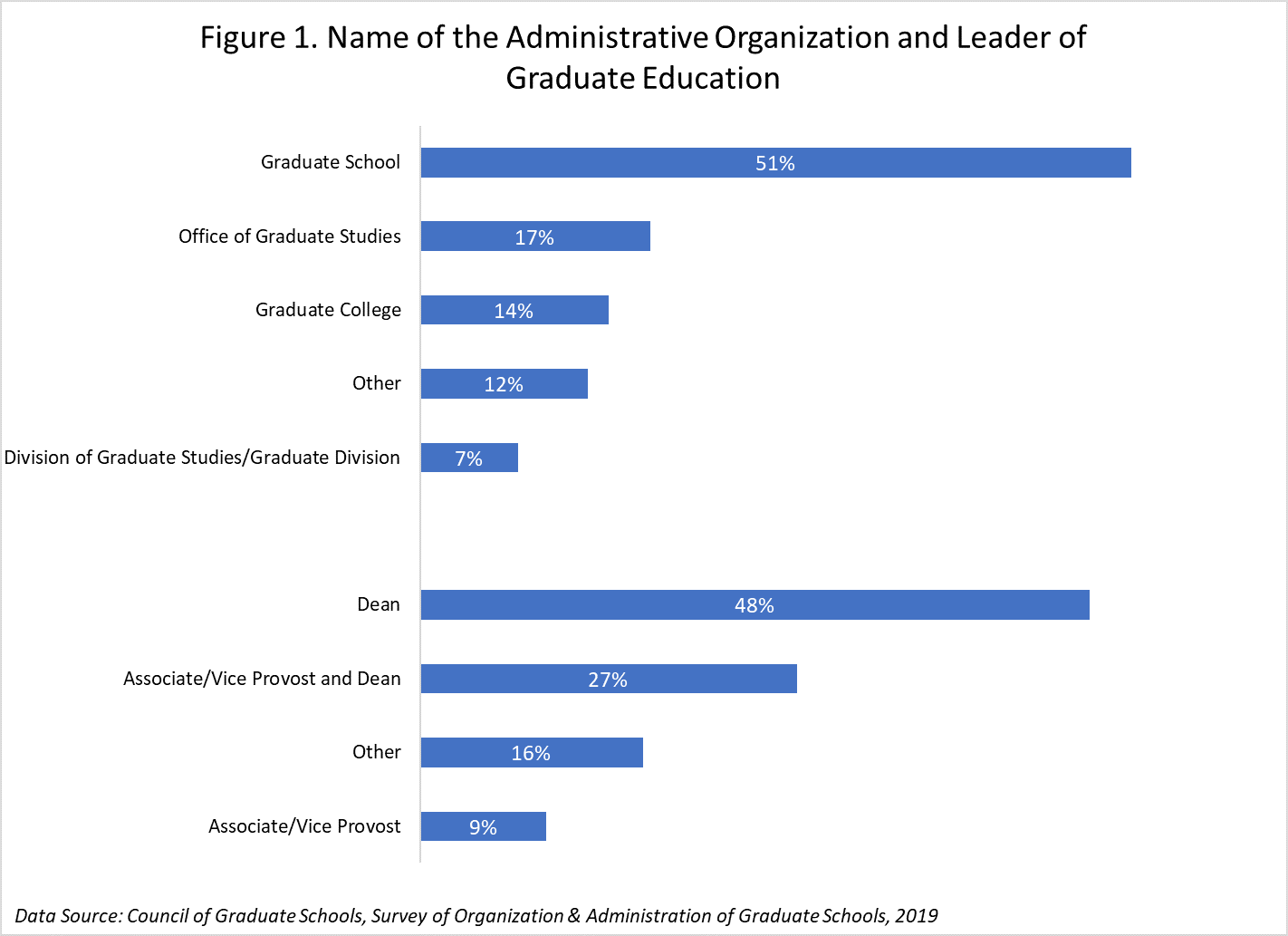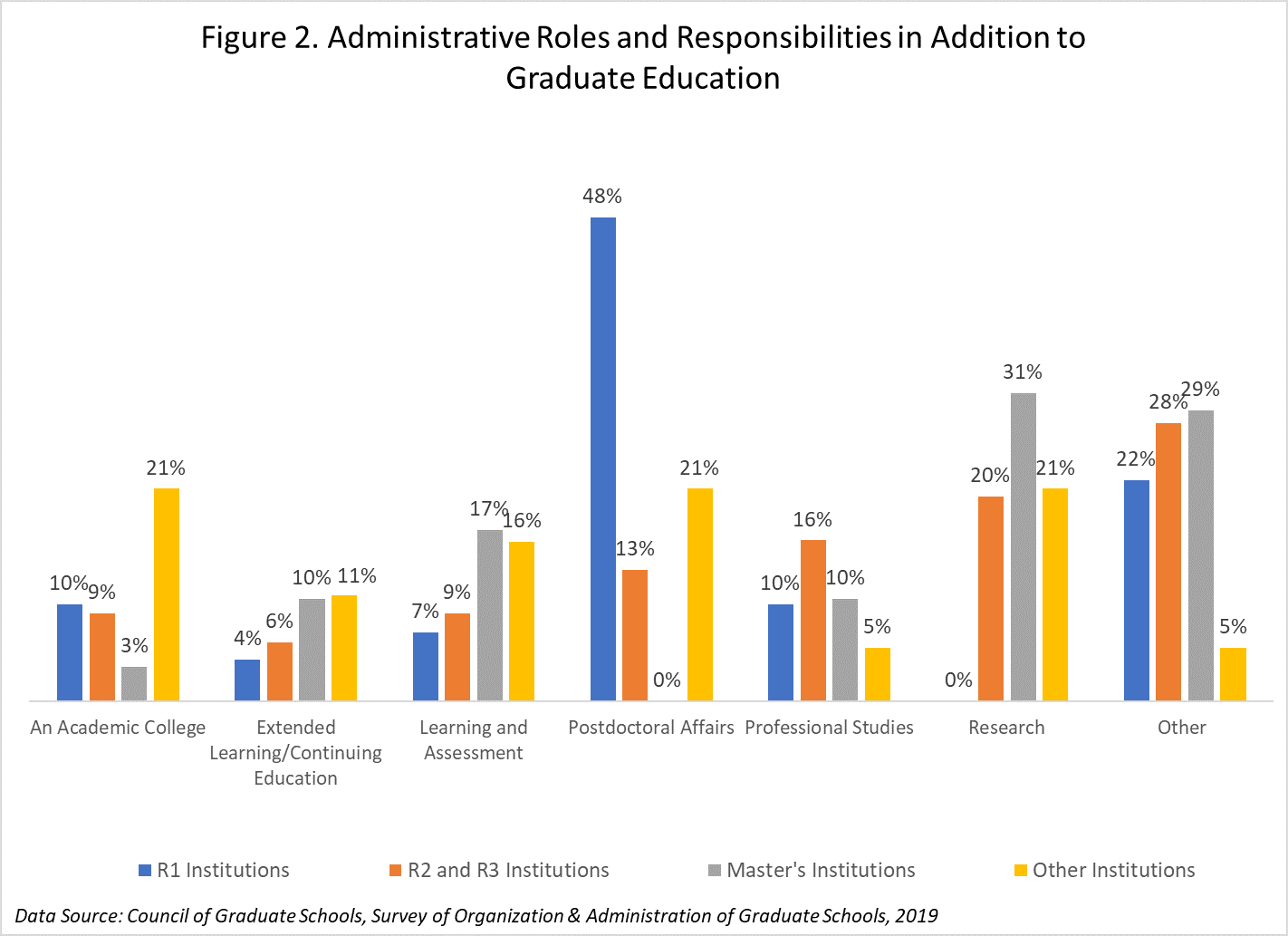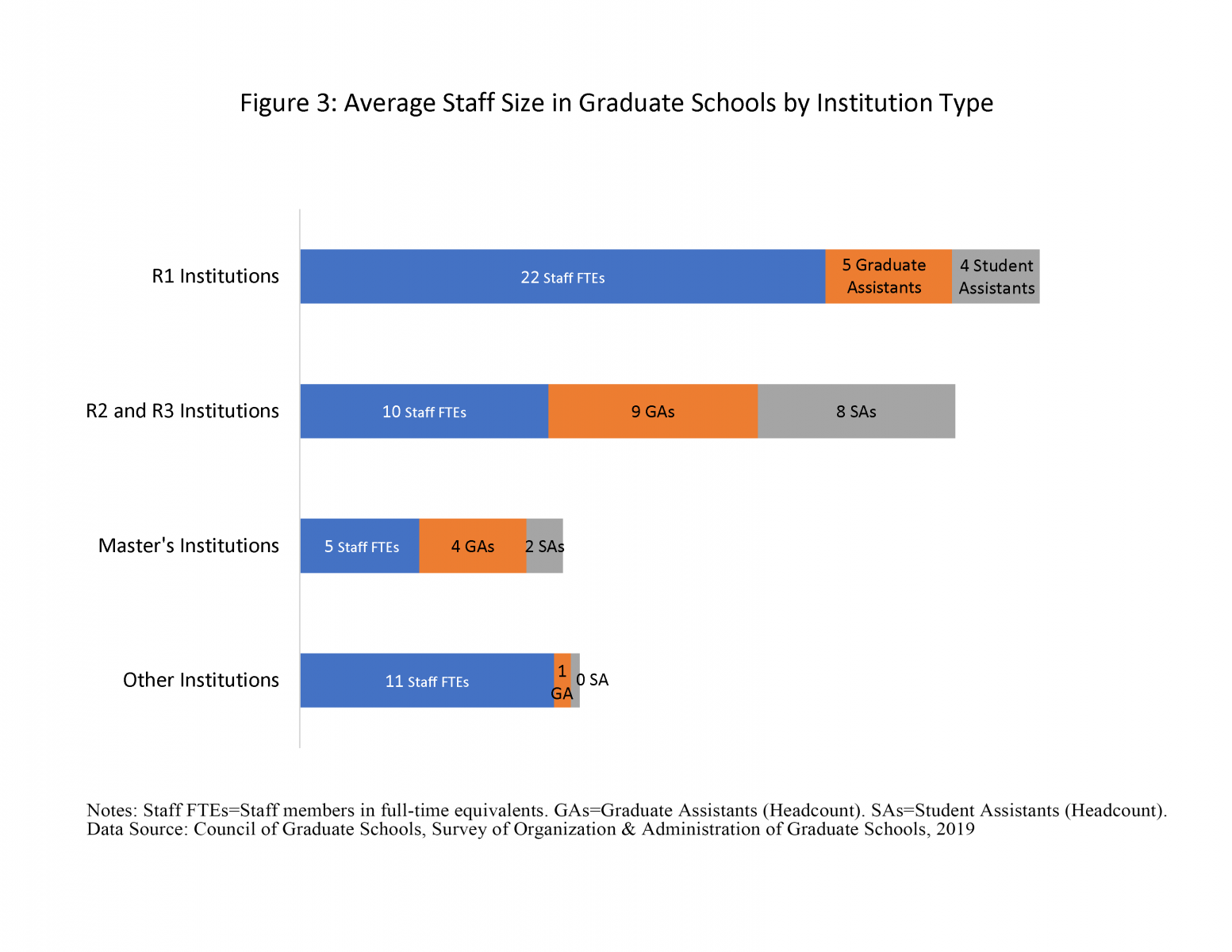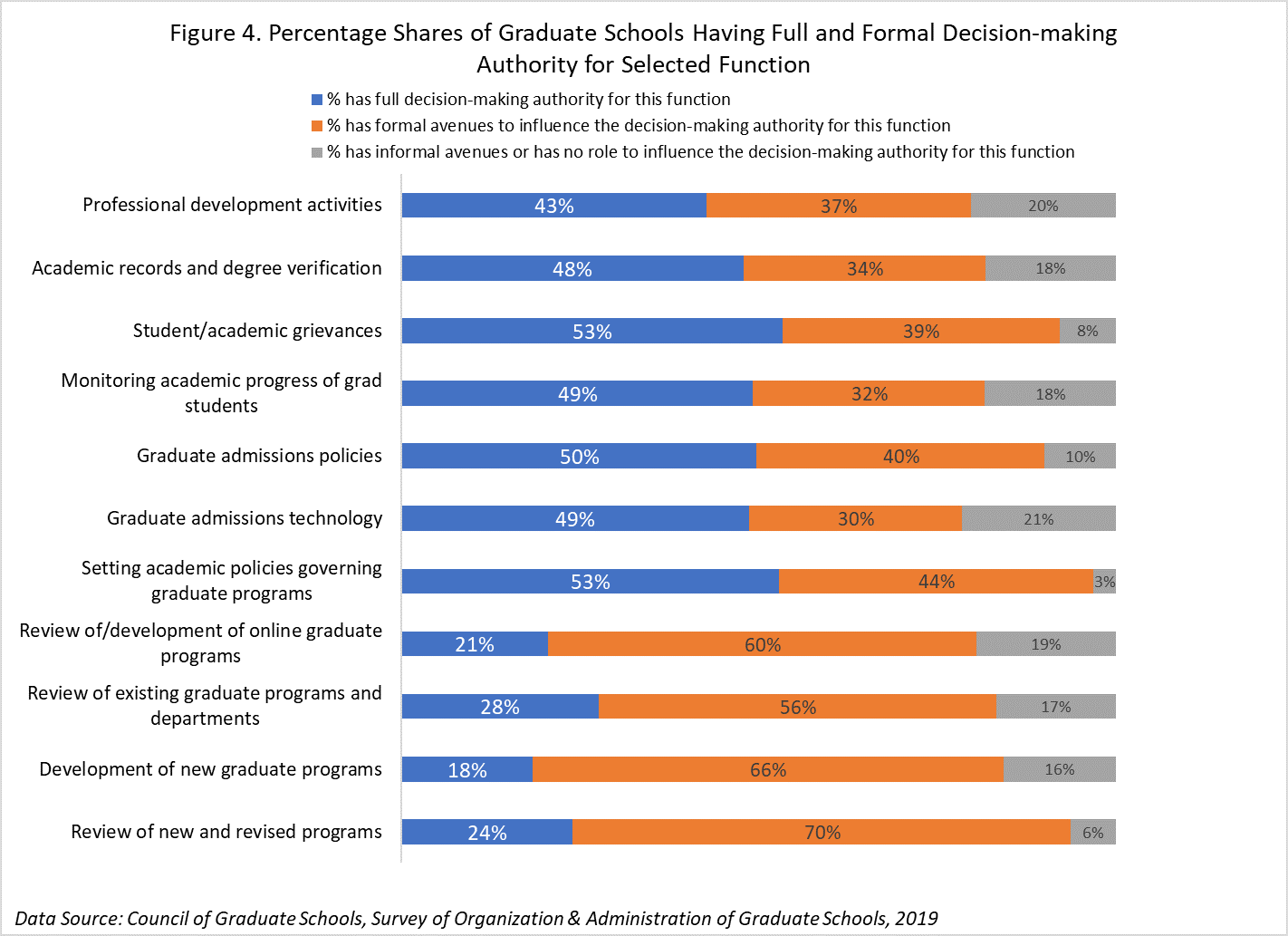You are on CGS' Legacy Site.
Thank you for visiting CGS! You are currently using CGS' legacy site, which is no longer supported. For up-to-date information, including publications purchasing and meeting information, please visit cgsnet.org.

By Hironao Okahana and Enyu Zhou
The Council of Graduate Schools (CGS) is a member association of over 480 U.S. and Canadian colleges and universities. Member universities vary in size, scope, and way that graduate programs are organizing and administering. Based on responses from the 200 universities that participated in the 2019 CGS Survey of Organization & Administration of Graduate Education, this brief provides selected insights into how graduate education is organized and administered in the U.S. and Canada. The finding affirms that the majority of responding institutions organizes the responsibilities of graduate education within an organizational unit** led by a dean. This organizational structure provides graduate education administrators with leadership roles that are similar in stature and expectations to those of academic colleges and collegiate deans. We also found that in addition to supporting graduate student success, the organizations responsible for graduate education, particularly at research-intensive institutions, also oversee postdoctoral trainees.
**The term “graduate schools” is formally or colloquially used to refer campus organizational units that hold the responsibility for graduate education across different fields of study. Although formal organizational labels vary between institutions (e.g., Graduate School, Graduate College, Office of Graduate Education, Graduate Division, etc.), in this brief, all such units are referred as “graduate schools” regardless of their formal names.
Key Findings:
- Overall, more than 64% of institutions responding to the survey indicated that their formal administrative name includes “Graduate School” or “Graduate College,” while 24% reported that their name includes a variation of “Office of Graduate Studies” or “Graduate Division.” The survey affirmed that 48% of graduate education organizations are led by a “Dean” and 27% are led by an “Associate/Vice Provost and Dean”. (Figure 1)

-
Roughly 48% of the graduate schools from R1 institutions have responsibility for postdoctoral affairs. While 31% of respondents from master’s colleges and universities and 20% of respondents from R2 and R3 institutions indicated that, in addition to graduate education, graduate schools are also responsible for research administration. None of the R1 graduate schools reported responsibility for research administration as an area of their oversight. (Figure 2)

-
The average number of staff members supporting graduate schools was reported as 22 full-time equivalents (FTEs) at participating R1 institutions, 10 FTEs at R2 and R3 institutions, and 5 FTEs at master’s colleges and universities. The average number of graduate assistants and student assistants working in graduate schools was the highest at R2 and R3 institutions. (Figure 3)

-
Approximately 50% of respondents indicated that their graduate schools have decision-making authority for setting academic policies governing graduate programs, establishing graduate admissions policies, monitoring the academic progress of graduate students, responding to academic grievances, and managing graduate admissions technology. In other areas, such as review of new and revised programs, development of new graduate programs, and review of/development of online graduate programs, more respondents noted that they have formal input into the decision-making processes at their institutions. (Figure 4)

Takeaway Points:
- Based on the survey, the majority of institutions organize graduate education roles and responsibilities within a Graduate School or Graduate College, led by a dean, affirming that these organizational units and their leaders have roles and responsibilities that are similar in stature to academic colleges and collegiate deans at their home institutions. In other words, campus leaders of graduate education are at the same tables with collegiate deans and other senior academic leaders, ensuring that the interests of graduate education are represented in these ranks.
- At R1 institutions, 48% of graduate schools oversee postdoctoral affairs. This finding underscores the essential leadership roles that graduate schools provide to support the experience and success of postdoctoral trainees. In the same ways that graduate schools support the mentoring and career and professional development activities for graduate students, they are also positioned to provide these support services for postdoctoral trainees.
- Compared to R1 institutions, graduate schools and their deans at other types of institutions were more likely to have broader areas of responsibilities beyond graduate education. Given the relative sizes of graduate programs, it might make sense that these units oversee other areas; however, they also have relatively fewer FTEs to support their units. It may be the case that graduate education administrators at these universities are asked to do more with less.
- The findings highlight a central role in which graduate schools can play in setting academic policies and standards for graduate programs, such as graduate student admissions policies, graduate student academic progress, and grievances. However, they also amplify that in other areas, roles and responsibilities of graduate schools include insights that influence a broad range of decision-making processes across the institution. Influencing faculty hiring or curricular decisions underscores the importance of nurturing collaborative relationships with academic colleges and programs, as well as with other campus units, such as student affairs units in promoting interests of graduate education and graduate students.
Conversation Starters:
We encourage graduate education units to engage in conversation about various models for organization and administration of graduate education at your institutions. Some of the questions that you may want to ask as a self-reflection or to your campus colleagues (i.e., college deans, graduate program directors, etc.), as well as with stakeholders include:
- What kind of organizational structure does your unit have? How does the organizational structure align with your unit’s goals and priorities?
- Where is your unit housed? Which areas of responsibilities does your unit cover? How many staff lines does your unit have? How does organizational placement reflect institutional priorities for graduate education?
- How does your unit engage other units on campus? What types of formal and informal interactions do graduate deans (or equivalents) have with their campus peers? What types of formal and informal interactions do rank and file staff members in your unit have with their counterparts in academic colleges, graduate programs, and other units?
- What different functions does your unit have? What kind of staffing levels does your unit have for different functions?
Additional Resources:
The Organization and Administration of Graduate Education. This publication provides an overview of the structures, leadership, and strategies that define contemporary graduate education. It also provides case studies from selected graduate schools addressing pressing issues.
CGS Strategic Consultation Services. The Council of Graduate Schools provides strategic consultations to member and nonmember institutions, boards, and state agencies to offer guidance as they make tactical decisions about the administration of graduate education. Our consultations draw upon extensive best practice and benchmarking research as well as the insights of experienced graduate deans from around the country.
About the Data Source:
The Council of Graduate Schools, Survey of Organization & Administration of Graduate Schools was distributed to CGS member institutions and members of the four regional graduate school affiliations in Spring 2019 (US, N=195; and Canada, N=5). This brief is based upon the participants who reported working in one of the four institution types based on the 2015 Carnegie Classification of Institutions of Higher Education. The Basic Carnegie Classification categories are aggregated to four categories as follows: Universities with Highest Research Activity (R1 Institutions), Universities with Higher Research Activity and Universities with Moderate Research Activity (R2 and R3 Institutions), Master’s Colleges and Universities (Master’s Institutions), and Other Institutions. The sample size by institution type is as follows: R1 Institutions (N=71), R2 and R3 Institutions (N=65), Master’s Institutions (N=52), and Other Institutions (N=12).
Author Contribution and Acknowledgment
The brief was prepared by Hironao Okahana and Enyu Zhou. H.O. conceived and designed the project and data collection instrument, as well as supervised the findings of this work. E.Z. performed data cleaning and analysis, prepared the figures and table. Both authors discussed and contributed to the final brief. CGS President Suzanne T. Ortega and CGS Senior Vice President Robert M. Augustine, as well as Radomir Mitic, Janet Gao, and Christian P.L. West provided feedback to earlier drafts of the brief. CGS Best Practices Team, CGS Research and Information Services Committee, CGS Committee on Master’s Degrees, and CGS Consultation Working Group provided feedback to an earlier version of the data collection instrument.




